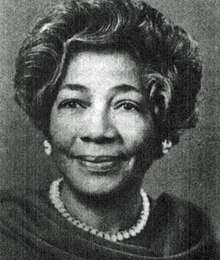Angie Turner King
Angie Lena Turner King ( December 9, 1905 – February 28, 2004)[1] was one of the first African-American women to gain degrees in chemistry and mathematics, and a PhD in mathematics education. She was a major influence on her students, including Margaret Strickland Collins and Katherine Goble Johnson.[2]
Angie Turner King | |
|---|---|
 | |
| Born | Angie Lena Turner December 9, 1905 |
| Died | February 28, 2004 (aged 98) |
| Alma mater |
|
| Scientific career | |
| Fields |
|
| Institutions |
|
| Notable students |
|
Early life and education
Angie Lena (née Turner) King was born in 1905 in Elkhorn, West Virginia, a segregated coal mining community.[2][1] She was the grandchild of slaves, living for a time with her grandmother after her mother died when King was eight,[2] and her father died in a coal mining accident.[1] She recalled sleeping in a cabin, where "in the winter time, when it would snow, I'd wake up with snow on my bed", and her lighter-skinned grandmother calling her "the black bitch": "I had it tough but it hasn't bothered my mind".[2] Later, she lived with her grandfather, and was then able to attend school.[1]
She had good grades, graduating from high school at 14 (in 1919), but was unaware that scholarships to college were a possibility.[2] King began teaching training at Bluefield Colored Institute (now Bluefield State College), transferring to West Virginia State College. She paid her way through school waiting tables and washing dishes.[2] She was awarded a Bachelor of Science, summa cum laude, in mathematics and chemistry in 1927, with a thesis reporting on her studies on solutions of tannic acid and hydrous ferric oxide.[2][1]
Career
King began teaching at the laboratory high school of West Virginia State College (WVSC), studying at Cornell University in the summer. She was awarded a master's degree in chemistry and mathematics in 1931.[2] She gained a teaching position at WVSC, and attended the University of Pittsburgh for her doctoral work. Her PhD was awarded in 1955 and reported in the local news.[3] Her dissertation topic was an analysis of algebra use in school textbooks before 1900.[4] Her master's thesis and dissertation were her only publications.[2]
In World War II, in response to a concern that the war would result in a shortage of college graduates needed as military officers after the war, a military training program called the Army Specialized Training Program (ASTP) was established.[5] The ASTP was segregated, and WVSC was one of six black colleges awarded ASTP units, and King taught chemistry in the program.[5]
King's career was distinguished by her mentoring and teaching, with a legacy of many students going on to post-graduate studies, including Katherine Johnson, one of the scientists featured in Hidden Figures.[2] Johnson singled her out as a major influence, saying King was "a wonderful teacher – bright, caring, and very rigorous".[6] In a questionnaire to former West Virginia State students, 27 of 72 respondents nominated King as their favorite teacher, and most of them had gone on to postgraduate education.[2] King received the West Virginia State College Alumnus of the Year in 1954.[1]
Personal life
King married Robert Elemore King in 1946, and they had five daughters.[1] King lived on the WVSC campus until her death in 2004.[7]
References
- Brown, Jeannette E. (2012). African American women chemists. New York: Oxford University Press. pp. 27–29. ISBN 978-0199742882. Retrieved February 18, 2017.
- Warren, Wini (1999). Black women scientists in the United States. Bloomington, Ind. [u.a.]: Indiana University Press. pp. 148–150. ISBN 0253336031.
- "Ph. D. Degree to Mrs. King". The Pittsburgh Courier. February 12, 1955. Retrieved February 18, 2017.
- King, Angie Turner (1955). An analysis of early algebra textbooks used in the American secondary schools before 1900. University of Pittsburgh. Retrieved April 21, 2017.
- Keefer, Louis E. (1994). "On the Homefront in World War II: Soldier-Scholars at West Virginia State College". West Virginia History. 53: 119–132. Retrieved February 18, 2017.
- Warren, Wini (1999). Black women scientists in the United States. Bloomington, Ind. [u.a.]: Indiana University Press. pp. 141. ISBN 0253336031.
katherine goble johnson.
- Collins, Sibrina. "King, Angie Lena Turner (1905–2004)". Blackpast.org. Retrieved February 18, 2017.